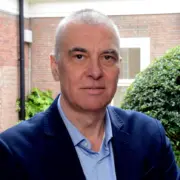Overal ter wereld investeren legers miljarden in kunstmatige intelligentie (AI), overtuigd dat het onmisbaar is om toekomstige oorlogen te winnen. Maar hoe slim zijn die slimme wapens eigenlijk? De Correspondent sprak erover met o.a. Strategisch Analist Patrick Bolder van HCSS:
De nieuwste wapenwedloop gaat niet om bommen, maar om algoritmes (en hoe die te foppen)
De Europese Commissie en EU-lidstaten bezuinigen fors op defensie en de ontwikkeling van nieuwe militaire technologie, waaronder AI. In de race om AI heeft Europa eigenlijk al verloren.
En dat leidt tot een lastig dilemma, zegt Patrick Bolder, strategisch analist bij het The Hague Centre for Strategic Studies. ‘De AI-techniek is er en zal in meer of mindere mate worden toegepast. Dat draai je niet meer terug. Wanneer je die systemen niet zelf maakt, loop je het risico dat anderen ze tegen je gebruiken, of dat je afhankelijk bent van anderen om de technologie te kopen.’
Daarmee verlies je ook de controle op hoe de systemen werken, vervolgt hij. ‘De Amerikanen zullen vermoedelijk geen inzicht geven in hun algoritmes, want als ze dat uit handen geven, verdwijnt hun strategisch voordeel. Daardoor weet je ook niet welke data zijn gebruikt om de modellen te trainen en hoe dat mogelijk van invloed is op hoe beslissingen tot stand komen.’
Maar zelf investeren in iets waarvan je niet weet of het werkt is ook niet zonder risico, zegt hij. ‘Als je te snel zelf gaat ontwikkelen, ontstaan fouten. Dan creëer je een schijnveiligheid waar je niets aan hebt.’
Lees het hele artikel van Lennart Hofman op de website van De Correspondent.
—
Eerder sprak De Correspondent al met Bolder over oorlog in de ruimte, na aanleiding van een mysterieuze lancering door Rusland, waarvan Amerika zei dat het een anti-satellietwapen was.
De Russen ontkennen dat. Volgens hen ging het om een klein ruimtevaartuig dat een satelliet inspecteerde. Maar de onrust was genoeg reden voor beide grootmachten om eind juli bijeen te komen en voor het eerst in zeven jaar te praten over normen in de ruimte.
De onrust is een direct gevolg van veranderingen op aarde, vertelde Patrick Bolder, onderzoeker aan het The Hague Centre for Strategic Studies.
Nu steeds meer verdragen voor ongewapende luchtverkenning verdwijnen of dreigen te verdwijnen (zoals Open Skies), zijn landen steeds meer afhankelijk van hun satellieten om te zien waar de ander mee bezig is. Maar dat betekent ook dat die satellieten nu zelf een doelwit worden. De Russen hebben met de ‘test’ laten zien dat ze dit kunnen.
Want uiteindelijk draait oorlog in de ruimte vooral om informatie, zegt Bolder. Simpel gezegd laat je met een anti-satellietwapen zien: ‘Ik maak jou blind en doof, zodat jij geen informatie hebt over wat ik aan het doen ben. En daarom heb ik een voordeel.’
Het belang van informatie geldt ook voor de militaire bruikbaarheid van AI, zegt hij: ‘Als ik meer informatie heb dan jij, of ik kan jouw informatie manipuleren, dan heb ik al gewonnen. Want als ik mijn besluitvorming beter en sneller kan doen, dan ben je nergens.’
Lees het hele artikel van Lennart Hofman op de website van De Correspondent.



